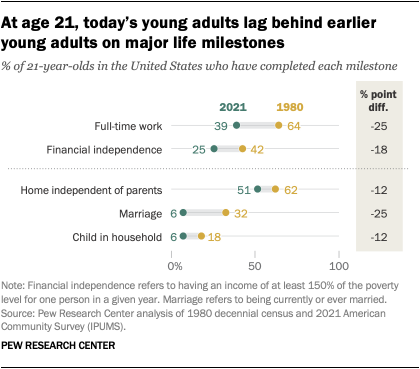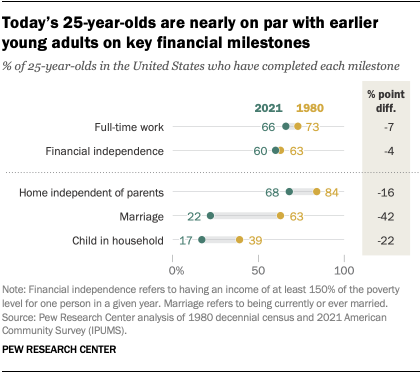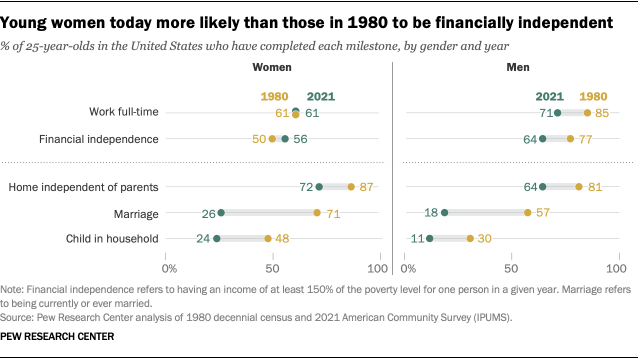
Young adults in the United States are reaching key life milestones later than they did 40 years ago, according to a new Pew Research Center analysis of Census Bureau data.
Adults who are 21 are less likely than their predecessors four decades ago to have reached five frequently cited milestones of adulthood: having a full-time job, being financially independent, living on their own, getting married and having a child. By the time they are 25, however, today’s young adults are somewhat closer to their predecessors in 1980 on two of these milestones: having a full-time job and financial independence.
In 2021, the most recent year with available data, 39% of 21-year-olds were working full time, compared with 64% in 1980. And only a quarter of people this age in 2021 were financially independent of their parents – meaning that their income was at least 150% of the poverty line – compared with 42% in 1980.
Pew Research Center conducted this analysis to find out how many young adults in the United States today are reaching key life milestones and compare this with the experiences of young adults in 1980.
The analysis uses 1980 decennial census data and the 2021 American Community Survey (ACS). Collected by the U.S. Census Bureau since 2001, the ACS is the largest household survey in the U.S., with a sample of more than 3 million addresses. It covers the topics previously included in the long form of the decennial census. The ACS is designed to provide estimates of the size and characteristics of the nation’s resident population.
These large datasets allow for reliable estimates of outcomes for people at a given age. This analysis looks at rates of achieving five milestones of adulthood for 21- and 25-year-olds.
The college enrollment statistics are based on the October school enrollment supplement of the Current Population Survey.
The microdata files used for this analysis were provided by the Integrated Public Use Microdata Series (IPUMS) from the University of Minnesota. IPUMS standardizes variable names and coding across years as much as possible, making it easier to analyze the data over time. The 1980 decennial census results are based on the 1% sample of the population.

One factor that has contributed to fewer 21-year-olds having full-time jobs is the increase in college enrollment over the past four decades. Today, almost half of 21-year-olds (48%) are enrolled in college, whereas about three-in-ten (31%) were enrolled in 1980.
Today’s 21-year-olds also trail their predecessors on the other milestones analyzed. Around half of 21-year-olds (51%) were living somewhere other than their parents’ home in 2021, whereas the same was true for 62% of people their age in 1980. And only 6% of 21-year-olds had ever been married or had a child in their household in 2021, compared with 32% and 18%, respectively, of their predecessors in 1980.
How 25-year-olds compare with their predecessors in 1980
By age 25, the financial differences between young adults today and those in 1980 are narrower but still statistically significant. About two-thirds of 25-year-olds (66%) were working full time in 2021, compared with 73% in 1980. And 60% were financially independent in 2021, compared with 63% in 1980.

However, 25-year-olds today still trail those of 1980 on milestones that relate more to family than finances.
In 2021, about two-thirds of 25-year-olds (68%) were living outside their parents’ home, compared with 84% in 1980. And only 22% of people this age were married in 2021, compared with 63% in 1980. The same pattern holds when it comes to having children: Just 17% of 25-year-olds in 2021 had a child, compared with 39% in 1980.
Gender differences in reaching life milestones
Young men and women today differ in how they stack up against their predecessors. Today’s 25-year-old women are just as likely as their predecessors in 1980 to work full time (both 61%) and more likely to be financially independent (56% vs. 50%). By contrast, today’s 25-year-old men are less likely than their predecessors in 1980 to have achieved these milestones.

Parents, for their part, appear to emphasize their children reaching financial milestones more than family milestones, according to a recent Pew Research Center survey. About 88% of U.S. parents with children younger than 18 say it’s extremely or very important to them that their children grow up to be financially independent and have jobs they enjoy – far higher than the shares who prioritize their children eventually getting married or having children of their own.




